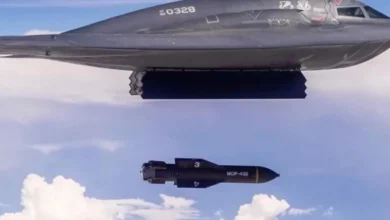The US entered Israel’s war with Iran late on Saturday when president Donald Trump authorised strikes against Iran targeting three nuclear facilities, which he called a “spectacular military success”.
The US president had stepped up his rhetoric against Tehran since Israel first struck Iran on June 13, repeating his insistence that it could never have a nuclear weapon. Tehran has consistently denied the claim, saying its uranium enrichment programme is for civilian purposes.
Israel had launched wide-scale air strikes against Iran’s nuclear facilities, military sites and private residences, killing top commanders, scientists and hundreds others. Both countries have traded wave after wave of devastating strikes since then.
Critics, analysts and key US lawmakers have debated the legality of Trump’s decision to strike Iran without prior approval from Congress
According to Article II of the US Constitution, the president has the authority to order the use of military force to defend the US and US persons against actual or anticipated attacks, as well as advance other important national interests.
Previous US presidents — both Democratic and Republican — have deployed US forces and ordered the use of military force without congressional authorisation on numerous occasions, according to the Council on Foreign Relations (CFR).
In addition to the powers granted to the president in Article II, Article I of the US Constitution gives Congress the authority to “declare War.”
However, this authority has never been interpreted — either by Congress or the executive branch — to require congressional authorisation for every military action that the president could initiate.
Should Trump have obtained congressional authorisation to strike Iran?
The War Power Resolution of 1973 curbed the president’s war-making powers.
While the president is commander-in-chief of the armed forces and can order attacks, his decisions must be within the guidelines of what is authorised by Congress, according to Al Jazeera.
However, the president can order the military in the case of a “sudden attack” or to respond to emergencies.
With regard to whether or not congressional authorisation is required as a matter of law, both Republican and Democratic presidents have generally preferred, for political and legal reasons, to seek congressional authorisation— or say that they are acting under previous authorizations — for any substantial or prolonged use of military force, CFR states.
President George H. W. Bush sought and received congressional authorisation for the Gulf War in 1991, and President George W Bush sought and received authorisations in 2001 and 2002 to use force against the perpetrators of the 9/11 attacks and against former Iraqi president Saddam Hussein.
How did US lawmakers react to the strikes?
Key progressive Senator Bernie Sanders was speaking at a rally in Oklahoma when Trump announced the attack.
“It is so grossly unconstitutional,” he said. “All of you know that the only entity that can take this country to war is the US Congress; the president does not have that right.”
US Congresswoman Alexandria Ocasio-Cortez said Trump has “impulsively risked launching a war that may ensnare us for generations,” adding that his decision was “absolutely and clearly grounds for impeachment.”
She also emphasised that bombing Iran was a “grave violation” of the Constitution and Congressional War Powers.
US Congresswoman Rashida Tlaib echoed the same sentiment, saying: “The American people do not want another forever war.”
Senate Armed Services Committee Chairman Roger Wicker, a Mississippi Republican, applauded the operation but cautioned that the US now faced “very serious choices ahead”, according to Reuters.
Senate Foreign Relations Committee Chairman Jim Risch, Republican of Idaho, said: “This war is Israel’s war, not our war, but Israel is one of our strongest allies and is disarming Iran for the good of the world.”
Risch added: “This is not the start of a forever war. There will not be American boots on the ground in Iran.”
US House Democratic Leader Hakeem Jeffries said: “President Trump misled the country about his intentions, failed to seek congressional authorisation for the use of military force and risks American entanglement in a potentially disastrous war in the Middle East.”
“Donald Trump shoulders complete and total responsibility for any adverse consequences that flow from his unilateral military action,” Jeffries said.
Democratic Senator Tim Kaine of Virginia said the US public “is overwhelmingly opposed to the US waging war on Iran” and said Trump displayed “horrible judgment.”
US House of Representatives Speaker Mike Johnson, a Republican of Louisiana, said: “The president gave Iran’s leader every opportunity to make a deal, but Iran refused to commit to a nuclear disarmament agreement.”
“The president’s decisive action prevents the world’s largest state sponsor of terrorism, which chants ‘Death to America,’ from obtaining the most lethal weapon on the planet.”
Max Rose, a former Democratic member of Congress who now is a senior adviser to the progressive veterans’ group “VoteVets,” said: “Trump’s decision to launch direct strikes against Iran without congressional authorization is illegal.”
Rose added: “This conflict is his and the Republicans who have abrogated all their responsibilities.”
When was the last time the US formally declared war?
In 1942, during World War II.
Since then, the US has gone to war in Korea, Vietnam, the Gulf, Afghanistan and Iraq, while carrying out strikes and interventions in numerous countries — Serbia, Libya, Somalia and Yemen, to name a few, according to Al Jazeera.







